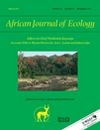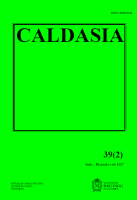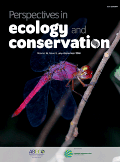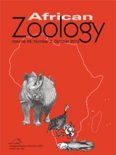
AFRICAN JOURNAL OF ECOLOGY
Scope & Guideline
Connecting Research and Conservation in Africa
Introduction
Aims and Scopes
- Biodiversity and Conservation:
Research focusing on the diversity of flora and fauna across various African ecosystems, assessing threats to biodiversity and proposing conservation strategies. - Ecological Dynamics and Interactions:
Studies on species interactions, community dynamics, and ecosystem processes, examining how organisms adapt and respond to environmental changes. - Impact of Human Activities:
Investigations into the effects of anthropogenic factors such as habitat destruction, climate change, and pollution on wildlife and ecosystems. - Restoration Ecology:
Research aimed at understanding and enhancing the recovery of degraded ecosystems, including the role of native species and management practices. - Applied Ecology and Management:
Practical studies that inform conservation policy and management strategies, often involving stakeholder engagement and community-based approaches.
Trending and Emerging
- Climate Change Impacts:
A significant increase in studies examining the effects of climate change on species distribution, ecosystem services, and biodiversity, highlighting the urgent need for adaptive management strategies. - Human-Wildlife Conflict:
Research on the dynamics of human-wildlife interactions is trending, with a focus on understanding conflicts and developing solutions that promote coexistence. - Community-Based Conservation:
An emerging emphasis on involving local communities in conservation efforts, recognizing their role in biodiversity preservation and sustainable resource management. - Technological Integration in Ecology:
The use of advanced technologies such as remote sensing, GPS tracking, and acoustic monitoring is increasingly common, enhancing data collection and analysis in ecological research. - Microbial and Soil Ecology:
Growing interest in the roles of soil health and microbial communities in ecosystem functioning, particularly in relation to restoration and sustainable agriculture.
Declining or Waning
- Traditional Ecological Knowledge:
Research integrating indigenous knowledge systems with ecological science has seen a decline, potentially overshadowed by more quantitative and experimental approaches. - Longitudinal Studies on Historical Data:
Long-term ecological studies that rely on historical datasets have become less frequent, as researchers may prioritize contemporary issues and immediate impacts over historical context. - Generalized Species Distribution Models:
While still relevant, the use of generalized models for predicting species distributions may be waning as researchers increasingly adopt more localized and detail-oriented approaches. - Invasive Species Management:
Although still important, the focus on invasive species management has shifted towards integrated approaches that consider broader ecological interactions rather than isolated case studies.
Similar Journals

CALDASIA
Advancing Agricultural Insights for a Sustainable FutureCALDASIA is a distinguished open-access journal dedicated to the field of Agricultural and Biological Sciences, published by INST CIENCIAS NATURALES, MUSEO HISTORIA NATURAL since its inception in 1981. Based in Colombia, this journal plays a pivotal role in disseminating scientific knowledge and fostering research collaboration across the globe. With a focus on diverse subjects within the biological sciences, CALDASIA aims to bridge gaps in research and support scholars, professionals, and students in advancing their work. With a 2023 Scopus Ranking of #132 out of 221 in its category, representing a 40th percentile ranking, it holds a solid position in the academic community, particularly recognized for its contributions to miscellaneous areas within agricultural and biological sciences. The journal remains committed to enhancing accessibility, as evidenced by its open-access policy since 2001, thereby ensuring that research findings reach a wider audience without barriers. For those returning to this vibrant field, CALDASIA serves as an essential resource for contemporary findings and discussions that shape environmental and biological scholarship.

INTERNATIONAL REVIEW OF HYDROBIOLOGY
Innovating Research for Sustainable Aquatic SystemsINTERNATIONAL REVIEW OF HYDROBIOLOGY is a prestigious academic journal dedicated to the dynamic fields of Aquatic Science and Ecology, Evolution, Behavior, and Systematics. Published by a reputable German publisher, this open-access journal ensures that groundbreaking research is readily available to a global audience, fostering collaboration and innovation within the scientific community. With an impressive impact factor and classification within the Q2 category of both Aquatic Science and Ecology, it ranks notably high on Scopus, standing at 211 out of 721 in Ecology and 84 out of 247 in Aquatic Science as of 2023. Covering a broad scope from fundamental hydrobiological research to applied ecological studies, the journal plays a crucial role in advancing knowledge and addressing contemporary environmental challenges. Researchers, professionals, and students will find INTERNATIONAL REVIEW OF HYDROBIOLOGY to be an essential resource for informing their own work and contributing to the global dialogue on aquatic systems and their conservation.

TROPICAL ECOLOGY
Connecting Research and Practice in Tropical EcologyTropical Ecology is a distinguished journal published by SpringerNature that has been at the forefront of advancing the field of ecology since its inception. With a focus on tropical ecosystems, it addresses critical areas such as conservation biology, systematics, and environmental science. The journal is indexed within leading databases and enjoys a respectable impact factor, ranking in the second quartile (Q2) in Ecology as well as in Plant Science, and third quartile (Q3) in Ecology, Evolution, Behavior and Systematics for 2023. Its insightful research contributions place it among the top-tier publications in Agricultural and Biological Sciences, specifically in rankings such as #185 in Plant Science and #178 in Ecology. While it currently operates under subscription access, it remains an essential resource for researchers, professionals, and students interested in the dynamics of tropical environments, fostering a greater understanding of ecological principles and practices that are pivotal for sustainable development. The journal operates with continuous publication from 1976 to 2024, ensuring timely dissemination of impactful research findings that contribute to the global body of knowledge.

Perspectives in Ecology and Conservation
Transforming conservation science through rigorous analysis.Perspectives in Ecology and Conservation, published by Elsevier Science Ltd, is a leading academic journal dedicated to advancing the fields of ecology, conservation, and environmental management. With a Q1 ranking in multiple categories, including Ecology, Management, Monitoring, Policy and Law, and Nature and Landscape Conservation, this journal boasts an impressive standing among its peers, making it essential reading for researchers and professionals. Since its inception in 2017 and running through 2024, it aims to provide innovative perspectives and critical analyses that enhance our understanding and practices in conservation science. The journal is accessible through open access options, facilitating broader dissemination of knowledge. Its commitment to addressing contemporary ecological challenges reinforces its importance in the academic community, promoting sustainable practices and informed policy-making in the face of urgent environmental issues.

Neotropical Biology and Conservation
Advancing Knowledge for a Sustainable NeotropicsNeotropical Biology and Conservation, published by Pensoft Publishers, serves as a pivotal platform for researchers and professionals dedicated to the understanding and preservation of biodiversity in the Neotropical region. This Open Access journal, operational since 2006 and based in Brazil, invites contributions that delve into the complexities of ecology, evolution, and conservation strategies pertinent to the diverse ecosystems of South and Central America. With a commendable 2023 impact factor reflected in its Q3 rankings across multiple categories including Animal Science, Ecology, and Plant Science, it stands as a valuable resource for academics seeking to publish innovative findings and foster dialogue in these critical areas of study. The journal's commitment to open access ensures that knowledge is readily available to anyone interested in advancing the field of neotropical biology and conservation. Join the global conversation and contribute to the vital work of preserving our planet’s rich biological heritage through rigorous research published in this esteemed journal.

Conservation Science and Practice
Empowering ecological solutions for a sustainable tomorrow.Conservation Science and Practice, published by WILEY, is a leading open access journal dedicated to advancing research and practice within the fields of ecology, environmental science, and conservation. Since its inception in 2019, this prestigious journal has quickly established itself as a vital resource for scholars and practitioners alike, holding impressive Quartile rankings in Ecology (Q1), Environmental Science (miscellaneous) (Q1), Global and Planetary Change (Q2), and Nature and Landscape Conservation (Q1) as of 2023. With a strong commitment to disseminating high-quality, peer-reviewed research, it serves as a platform for innovative solutions to the complex challenges faced in conservation today. The journal is accessible to a global audience, promoting the dissemination of critical findings that inform policy and practice in diverse settings. Researchers, professionals, and students looking to stay at the forefront of conservation science will find invaluable insights and developments within its pages. Join the conversation in shaping sustainable futures through cutting-edge research in Conservation Science and Practice.

ACTA OECOLOGICA-INTERNATIONAL JOURNAL OF ECOLOGY
Advancing Sustainability through Cutting-Edge ResearchACTA OECOLOGICA-INTERNATIONAL JOURNAL OF ECOLOGY, published by Elsevier, stands as a prominent platform for disseminating innovative research in the diverse field of ecology. Operating since 1983 and continuing to make significant contributions into 2024, this journal features critical studies that advance our understanding of ecological systems, behaviors, and conservation efforts. With an impressive Q2 ranking in both the ecology and nature conservation categories, it exemplifies high-quality scholarship, reflected in its Scopus rankings—#74 in Environmental Science and #254 in Agricultural and Biological Sciences. Researchers, professionals, and students in the field are invited to explore the latest findings and methodologies that address pivotal ecological issues. As a journal committed to fostering academic collaboration, ACTA OECOLOGICA is essential for anyone dedicated to enhancing their comprehension of ecological dynamics and advancing sustainability practices globally.

AFRICAN ZOOLOGY
Exploring Africa's Rich BiodiversityAFRICAN ZOOLOGY, published by Taylor & Francis Ltd, stands as a significant journal in the realm of Animal Science and Zoology, with a proud history dating back to 1996 and slated to continue until 2024. With an ISSN of 1562-7020 and E-ISSN 2224-073X, this journal provides a reputable platform for researchers and practitioners dedicated to the study of animal biology across the African continent. It has been recognized for its quality scholarship, evidenced by its Q3 categorization in the 2023 Scopus quartile rankings and an impressive rank of #182 out of 490 within its field. As an open-access journal, it facilitates the dissemination of vital research findings and promotes broader accessibility, catering to a diverse audience of professionals, scholars, and students alike. The journal aims to enhance our understanding of wildlife, conservation, and ecosystem dynamics in Africa, fostering collaborations that address critical ecological challenges. For researchers and enthusiasts keen on contributing to and staying informed about advancements in zoological science, AFRICAN ZOOLOGY is an essential resource that enriches the global discourse on biodiversity and conservation efforts.

Ecosistemas
Unveiling the dynamics of nature through collaborative study.Ecosistemas is a prominent Open Access journal published by the ASOCIACION ESPANOLA ECOLOGIA TERRESTRE, specializing in the field of ecology. Since its inception in 2001, it has dedicated itself to advancing ecological knowledge and research, fostering an inclusive platform for the dissemination of cutting-edge studies that span ecological interactions, sustainability, and biodiversity. The journal, based in Spain, has established its reputation with notable rankings such as Q3 in the field of Ecology and Q4 in Ecology, Evolution, Behavior, and Systematics, reflecting its commitment to quality research. With a Scopus Ranks position placing it in the 40th and 37th percentiles for its categories, Ecosistemas is integral to the academic community, serving researchers, professionals, and students alike. It provides a vital resource for those seeking to understand ecological dynamics and environmental challenges, facilitating open access to important findings and discussions that shape the future of our ecosystems.

RUSSIAN JOURNAL OF ECOLOGY
Navigating the Complexities of Ecology in Russia and BeyondRUSSIAN JOURNAL OF ECOLOGY, published by PLEIADES PUBLISHING INC, stands as a critical resource within the field of ecology, offering an array of research insights that span various ecological topics. With an ISSN of 1067-4136 and an E-ISSN of 1608-3334, this journal has been consistently disseminating knowledge since its inception in 1996, now converging towards 2024. Despite its current Q4 ranking in the Ecology, Evolution, Behavior and Systematics category, the journal has carved out a niche in the publication landscape, particularly for scholars focused on the rich and diverse ecological phenomena of Russia and surrounding territories. The journal aims to foster interdisciplinary collaboration and innovation by providing a platform for the dissemination of high-quality research. While it currently lacks open access options, readers can expect in-depth studies and analytical discourses that contribute meaningfully to the global understanding of ecological systems. With an impressive Scopus rank, this journal remains an important outlet for researchers, professionals, and students committed to advancing ecological science.